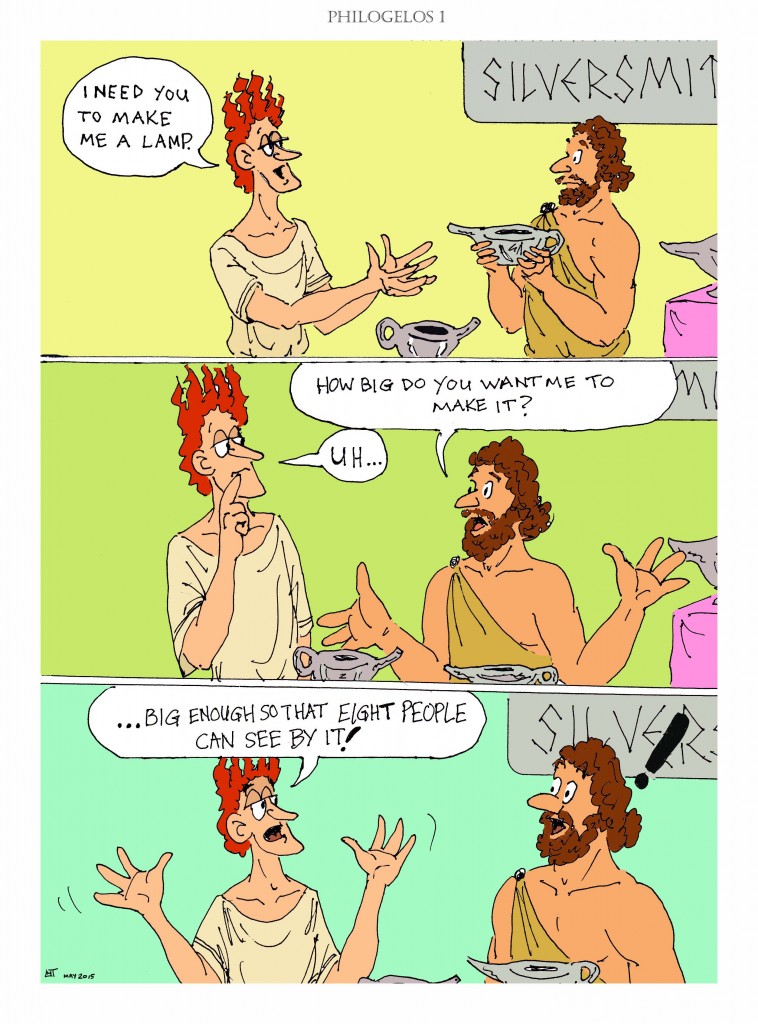Text and cartoons by Linda Thompson
The Philogelos, typically translated as “the joker” or “the one who loves laughter”, is an ancient Greek collection of approximately 265 jokes. Dating to the 4th or 5th century CE, it typically bears the title of the world’s oldest surviving collection of jokes.
The Philogelos is arranged according to subject. Some subject categories translate easily: misers and cheapskates, wise guys and smart-asses, grouches, cowards, envious people, fat people, drunks, bad breath, flatulence. Some jokes in the collection are examples of ancient versions of the ethnic joke: the ethnic groups targeted in the Philogelos are people from the three towns of Abdera, Sidon, and Kyme in the eastern Mediterranean area. The majority of jokes in the Philogelos are about individuals identified in Greek by the term scholastikos – those who are over-educated or foolish by virtue of their learning.
Current editions of the Philogelos are compiled from various manuscripts from medieval and later periods. The earliest version is 10th century manuscript; the most complete version dates from the 11th century. This version ascribes authorship to two otherwise unknown men, Hierokles and Philagrios. A Byzantine dictionary/encyclopedia, the Suda (a work similar in its format and wealth of mis/information to Pliny the Elder’s Natural Histories), names as author one Philostion, possibly the Philostion who was a famous early imperial writer of mime skits.
Cartoons based on the Philogelos
After reading Dan Crompton’s translation of the Philogelos (A Funny Thing Happened on the Way to the Forum: The World’s Oldest Joke Book [2010]), Linda Thompson was struck by the idea that a number of the jokes in the collection could work well as cartoons. Here Linda describes the process of converting ancient jokes to modern comics. The first cartoon in the series continues below.
Being an amateur artist, I looked upon this as a challenge, and promptly set about illustrating some of the jokes as cartoons. Granted, this does require some minor changes in the telling of any given joke, such as converting third person narrative into first and second person dialogue, incorporating contemporary colloquialisms, and occasionally rephrasing to achieve a more natural conversation style. As I did so, I did my best to stay as true as possible to what I felt was the spirit of the joke. One of the NML’s three main organizational themes is “language in society”, and one of the oldest functions of language in any society has been to serve as a means of expressing humor.
Since these are cartoons, I did not make any special attempt to be perfectly historically accurate in my drawings. At the same time, I did my best not to include anything that I knew would be egregiously anachronistic. Some of the topics or gags that occur in the Philogelos will seem tasteless and inappropriate to modern sensibilities: notable examples are those referring to execution, suicide, childhood mortality, defecation, incest, misogyny, etc. Jokes on these themes have been left out of this collection of cartoons. However, it must be kept in mind that such jokes existed in ancient times, just as they do today.
*Notes on the text and translation
The Greek text accompanying each joke is taken from Philogelos, ed. R.E. Dawe. Bibliotheca Teubneriana. Munich and Leipzig: K.G. Saur, 2000. The English translation is that of Crompton, listed above. Each joke’s number refers to its number in the Greek (Teubner) edition.



